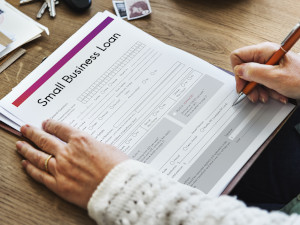
LOANS FOR SMALL BUSINESSES
As a preferred lender for the U.S. Small Business Administration (SBA), Heritage Bank is able to offer fast approval and processing on all SBA loan applications.
SBA Loan Financing
SBA loans are guaranteed by the U.S. Small Business Administration, a government agency that offers financial programs to small businesses. SBA loans allow businesses to retain more capital to grow their business with loan amounts up to $5M. Heritage Bank is a SBA Preferred Lender.
How does our Loan process work?
We offer a digital application process combined with personalized 1-on-1 lending services. To begin, simply submit your inquiry using the form below. Your information is sent directly to our team. Once received, we’ll email you application information and a team member will call you to discuss your equipment financing needs.
How can I use SBA funds?
- Expansion
- Working capital
- Real estate purchase
- Refinance / Debt Consolidation
- Business acquisition
- Equipment purchase
Why Choose Heritage Bank?
- Hassle-Free Lending: You don’t want squeezed into a loan that isn’t right for your business, that’s why we provide pressure free lending services. Get answers, check rates and more, on your own terms.
- Dedicated Support: Work directly with a dedicated Heritage Bank Commercial Relationship Manager throughout your loan process.
- Fast Decisions: Our simple application process helps you quickly submit everything we need so you can get a decision back sooner.
SBA LOAN FAQs
WHAT CAN This LOAN BE USED FOR?
A variety of business needs and purposes qualify for funding through an SBA loan. Typical financing includes commercial real estate purchases and refinancing, equipment purchases, existing debt refinancing, tenant improvements, business acquisitions, partner buyouts, construction, inventory purchase, working capital and more.
WHAT ARE THE BENEFITS?
Some benefits of SBA loans are that they may include lower down payments, interest rates, and longer repayment terms compared to non-SBA loans. The interest rate depends on your creditworthiness, but generally SBA loans have rates and fees comparable to non-SBA loans. 1 2
WHAT ARE THE MAIN ELIGIBILITY REQUIREMENTS?
- Operating Business
- Organized for Profit
- Located in the United States
- Small Under SBA Size Requirements
- Demonstrate the need for the desired credit, and it not be available on a conventional loan
WHAT INFORMATION AND DOCUMENTATION ARE NEEDED FOR A TYPICAL LOAN PACKAGE?
- Completed loan application documents
- Personal financial statement
- Last three years personal and business tax returns
- Business plan with financial projections
- Current balance sheet & profit and loss statement
- List of all existing business debt including term, balance, interest rate and monthly payment
- Proposed use of loan proceeds
- Owner resume
WHAT ARE THE BORROWING LIMITS?
Loan limits are based on the loan amount and program type. For example, the maximum amount for 7(a) loans is $5 million, SBA Express loans is $350,000 and SBA Export Express loans is $500,000.
WHAT IS THE EQUITY REQUIREMENT?
For a Change of Ownership & Start Up Businesses (or businesses that have been generating revenue for 1 year or less), there is a minimum equity requirement of 10% of total project costs.
WHERE CAN THE SOURCE OF YOUR EQUITY INJECTION COME FROM?
- Cash that is not borrowed
- Cash that is borrowed – source of repayment is from a source other than the subject business.
- Standby debt/seller carryback – only debt that is on full standby with no payments or interest for the term of the SBA guaranteed loan is considered equity into the project.
IS THE SELLER ALLOWED TO FINANCE ANY PART OF A BUSINESS SALE?
Yes, the seller can finance a portion of the business sale either on full standby until the SBA loan is paid in full (this is treated as equity into the project) or it can be with repayment terms that are similar to the SBA loan (this is treated as debt for the business).
WHAT IS THE TIMELINE FROM START TO FINISH FOR OBTAINING the LOAN?
The amount of time it takes to process a loan depends on multiple factors, including how quickly the borrower responds to the bank’s requests for information or documents and how many outside parties (contractors, appraisers, etc.) may be involved in your project. Because of these variables it can take between 30-90 days depending on the complexity of the file.
WHAT ARE THE LOAN TERMS?
SBA requires that all loans are fully amortizing, as SBA does not allow balloon payments. The following are acceptable loan terms based on the use of loan proceeds:
- Working capital, inventory loans, and financing of intangible assets (including goodwill) must not exceed 10 years
- Generally, equipment, fixtures, or furniture loans should not exceed 10 years. Can go up to 15 years if the IRS asset class useful life supports the term.
- Real estate loans (including acquisition & construction) must not exceed 25 years
- Leasehold improvements may not exceed 10 years
- Mixed purpose loans, when proceeds are use for multiple purposes (RE, working capital, machinery & equipment, or refi of an of these), the maturity may be a blended maturity or, if 51% or more of the use of proceeds are for real estate, the maximum maturity may be up to 25 years
WHAT ARE THE RATES?
Rates are determined based on the risk associated with the loan. SBA allows fixed and variable interest rates. The interest rates are tied to the Wall Street Journal Prime Rate. For a standard SBA 7a loan greater than $50,000 with a maturity of 7 years or more, the interest rate cannot exceed Prime + 2.75%* (for both fixed or variable rate). 3
- Rates may vary according to term and overall creditworthiness. To see what rate your business may qualify for, contact us today at no obligation.
- If your business is organized as a general partnership, your credit score may be impacted.
- Based on WSJ prime as of 6/22/2021.
